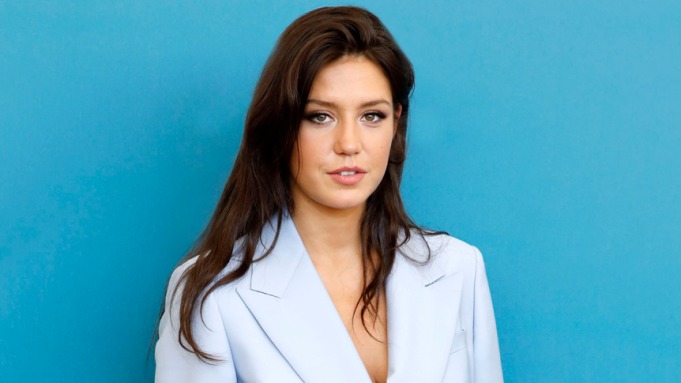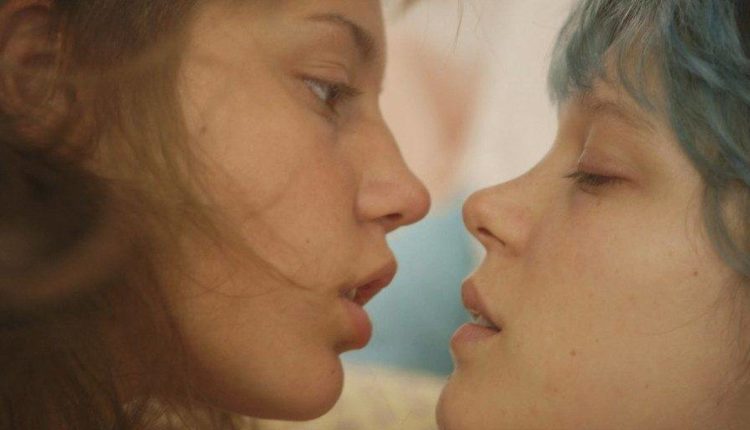Only eight years have passed since Adele Exarchopoulos emerged as the Cannes Film Festival’s cinematic surprise. With 2013’s Blue Is the Warmest Color, Abdellatif Kechiche’s critically acclaimed lesbian romance, the French actress not only had a major breakthrough moment on the Croisette but also made history by becoming the first actress to win the Palme d’Or — along with her co-star Lea Seydoux — and, at the time, its youngest ever winner.
Exarchopoulos, now 27 and having made multiple trips to Cannes since then, comes back with two new pictures. She plays a party-loving flight attendant for a low-cost European airline in Julie Lecoustre and Emmanuel Marre’s Zero Fucks Given, which is featured in the Critics’ Week sidebar. As she travels from one place to another, she struggles with her sense of herself and purpose.
She also appears in Cédric Jimenez’s thriller The Stronghold, which was picked up by Netflix during Cannes and is out of competition. The Stronghold is set in the violent suburbs of Marseille and follows the infamous BAC police brigade, who use dubious methods to increase drug seizures stats.
Exarchopoulos discusses her relationship with Cannes and how it was the “beginning of everything” in an interview with The Hollywood Reporter. She also takes into account the good and the bad (Sean Penn’s The Last Face), the career path she’s taken since her explosive breakthrough in Blue is the Warmest Color, and why Thierry Fremaux might not want to know what happened to her Palme d’Or statuette.
You’re going back to the festival where you had your significant breakthrough, took home the Palme d’Or, and returned repeatedly afterward. Do you have a soft spot in your heart for Cannes?
I definitely have vivid memories of Cannes. But the interesting thing is that I wasn’t really aware of what was happening for Blue Is the Warmest Color. Everything was interesting for me because I had no idea about publicity and had no idea whether anything was important or not. We each won a Palme d’Or? I had no idea! After a night out with my pals, one of them said, “Wow, did you know that the Palme would go to an actor for the first time ever and probably the final time,” and I was like, “No!” Therefore, Cannes is the start of everything for me, but I’ve also had both kinds of Cannes experiences. Everyone said “oh, it’s fantastic” when I chose Blue Is the Warmest Color, and then I chose the Sean Penn film (The Last Face), which was quite challenging. Cannes has the power to either destroy or build you. Of course there is constructive criticism, but there is also frequently criticism that seems extremely unfair. A lot of noise is present!
Where’s the Palme now?
Oh my goodness, I really hope Thierry Fremaux never reads this interview. Since they had to manufacture them, we received our trophies a year later than expected. I was thrilled that we had a special celebration. I was so pleased that when the Palme arrived on this plinth to hold it up, I… I ruined it. I basically attempted to keep it held together without glueing it back. It’s currently at my parents’ house, however. However, I must admit that I enjoy the tale more than the statue alone.
Despite its terrible title, Zero Fucks Given is a pretty engaging movie that provides a fascinating glimpse into the lonesome life of a low-budget plane stewardess. Why did you want the job?
I’ve seen the directors’ previous short films, which were in the same vein and had a distinctly documentary, organic feel. Marre also admitted that he didn’t have a script at the time and that his only goals were to talk about loneliness and how to find meaning in life. He said that the team would be very small and that we wouldn’t technically have permission to film on the planes, so we would work out a deal where everyone on board would agree to be filmed in exchange for getting to travel for free. And he asked, “Would you like to accompany me?”
I believe you were the only working actor in the movie.
Just my sister and I were there. And one of the film’s producers is my father! However, each individual is their own unique real-life character. The airlines were aware and chose a few stewardesses. Really, that was an experience. On an iPhone, certain sequences were occasionally filmed. It was quite bizarre and had a documentary-like quality. I was applying my own makeup because there was none. It implied that it was very difficult to avoid becoming engrossed with the persona.
When you observe the dull repetition, has it altered the way you feel about persons who hold those types of jobs?
To be completely honest, having the role of a stewardess at a budget airline let me realise how difficult the routine is and how little you can do while in the air. As an illustration, as we were about to take off, I received a message from my son’s school about a problem. I tried to manage it, but we had to take off, so I was powerless for several hours. It’s incredibly difficult. There is also the image of the stewardess, who travel the world while staying in hotels with their teams while portraying the paradox of being perpetually away from home and unable to forge genuine connections.
A radically different movie, The Stronghold is a thriller set in the seedy neighbourhoods outside of Marseille. What drew you to this particular genre of film?
Although it’s a commercial movie, I particularly like how it depicted individuals on both sides, including those in this seedy neighbourhood, who were only trying to survive. The individuals wearing suits are the leaders of these drug trafficking groups. They are never the ones to experience any difficulties. It demonstrated that families are the ones that suffer the most. It serves as a really wonderful mirror for society, reflecting what happens when people are forced to adhere to extreme right-wing ideology.
Since Blue Is the Warmest Color, you’ve seen a really diverse range of movies. When selecting your projects, have you chosen to follow a specific career path?
I was quite little when I think back, so I don’t recall trying to have any kind of plan. I recall receiving numerous offers, but what makes me feel truly proud is that I was honest with myself. People may think I can accomplish anything now, I reasoned, but I know I can’t since I still have a lot to learn. I won’t reveal which films, of course, but there were some that I wasn’t especially proud of and had parts that I wished I hadn’t filmed. But I always keep in mind the real reason I made them. And it was either for a character, a human relationship, or working with a director. However, I believe that even when it’s unintentional, the decisions you make may still be highly political and show a lot about who you are. I simply made an effort to trust my gut, and so far, I have no regrets. After such a significant breakout, dealing with the numerous offers and determining the best course of action must have been challenging. It was challenging because after spending a year travelling with Blue Is the Warmest Color, which was awesome because I learned a lot about myself, defended the film, and discovered a lot of new things, but I had to return to reality and make these decisions. It was also the way that people were attempting to change you into something, such as saying things like, “Oh, it would be good if you lost weight” or “If you did this.” I was telling myself one day, “Okay,” and “I don’t want to be what people project about me.” I don’t want to be like those folks who become lonely while filming movie after movie. I was really hoping to maintain my freedom. It was difficult, but fortunately, everyone in the area, including my family, is not involved in the industry and doesn’t give a damn about it. So there was still a sense of good fortune and pleasure — like, “Wow, I’m working with Sean Penn or “Oh la la,” I’m working with Ralph Fiennes!” I was never bored.



